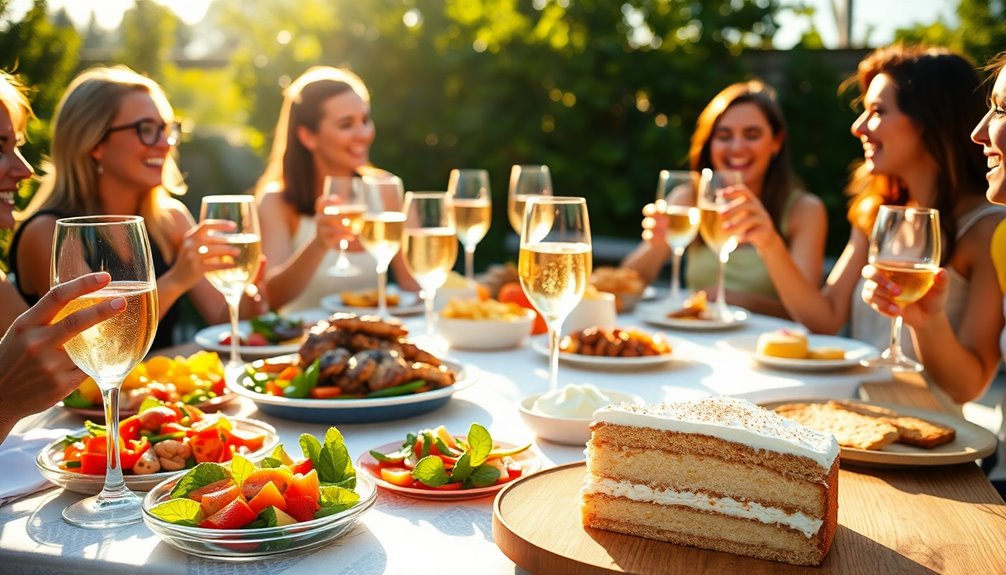The phrase "Eat, Drink, and Be Merry" encourages you to embrace life's joys despite its uncertainties. It highlights the importance of savoring moments with food and drink, rooted in both cultural traditions and biblical teachings. While it invites indulgence, it also reminds you of the need for balance between enjoyment and spiritual awareness. Historically, feasting has reinforced community bonds and celebrations, creating shared memories. Rather than fostering hedonism, this phrase calls for gratitude and mindfulness in your pursuits. If you're curious about how this idea weaves through history and culture, there's much more to explore.
Key Takeaways
- "Eat, Drink, and Be Merry" reflects the enjoyment of life as a divine gift, emphasizing the importance of gratitude and mindfulness.
- The phrase is often misinterpreted as endorsing hedonism, but it encourages balance between joy and spiritual responsibilities.
- Historical feasting traditions highlight social bonding, celebrating life events, and expressing cultural values, fostering community and gratitude.
- Scripture warns against excessive indulgence, promoting deeper fulfillment through a relationship with God rather than materialism.
- Communal meals enhance mental well-being and belonging, creating cherished traditions that celebrate diversity and strengthen social connections.
Introduction

In exploring the phrase "eat, drink, and be merry," you'll find it steeped in both cultural significance and philosophical debate. This saying captures the essence of enjoying life amid its fleeting nature. It echoes through history, often linked to biblical verses like 1 Corinthians 15:32, which critiques a hedonistic approach while reminding us of life's impermanence.
At its core, the phrase embodies the Epicurean philosophy that encourages you to pursue pleasure and revel in the joys of existence. It's a call to savor life's experiences, whether through a delicious meal, a refreshing drink, or moments of laughter and connection with others. You might recognize it in literature and music, from Shakespearean plays to contemporary songs by artists like the Dave Matthews Band, showcasing its enduring relevance.
However, it's essential to acknowledge the tension inherent in "eat, drink, and be merry." While you're encouraged to enjoy life, there's also a caution against excessive indulgence. This duality reminds you to balance pleasure with moral and spiritual responsibility, guiding your choices as you navigate the complexities of life. Additionally, incorporating natural sweeteners like Manuka honey can enhance your well-being while indulging in life's pleasures.
Biblical Origins of Joy
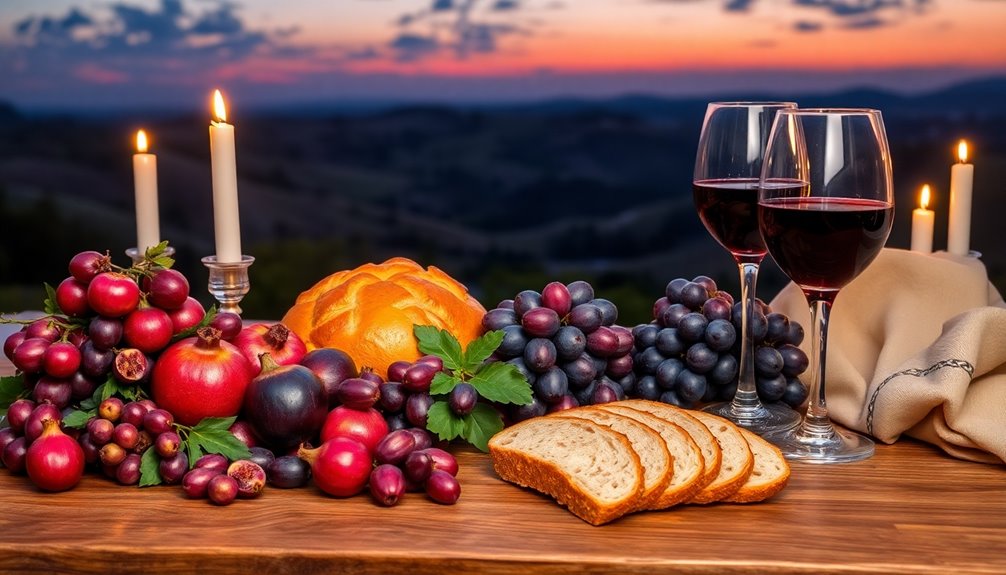
When you consider the phrase "eat, drink, and be merry," it's essential to explore its biblical roots.
Key verses like Ecclesiastes 8:15 remind you that joy is a gift from God, while others warn against enjoying life without spiritual accountability.
Primary Bible References
Throughout the ages, the phrase "eat, drink, and be merry" has resonated deeply within biblical texts, revealing a complex relationship between joy and moral responsibility. In Isaiah 22:13, you're warned against excessive revelry while facing impending judgment, reminding you that joy must be balanced with awareness of consequences.
Conversely, Ecclesiastes 8:15 encourages you to enjoy life's simple pleasures, like eating and drinking, as gifts from God. This highlights the importance of finding joy amidst challenges.
Yet, not all biblical references advocate for unrestrained hedonism. 1 Corinthians 15:32 critiques a mindset that says, "Let us eat and drink, for tomorrow we die," linking this attitude to a denial of the resurrection and eternal life.
Similarly, in Luke 12:19, the parable of the rich fool illustrates the foolishness of valuing material pleasures above spiritual well-being.
These scriptures collectively emphasize the tension between enjoying life and living righteously. They advocate for a thoughtful approach to pleasure, encouraging you to embrace joy while remaining mindful of your moral responsibilities.
In this balance, true joy can flourish.
Secondary Bible References
While joy is often seen as a fleeting emotion, the Bible presents it as a profound and lasting state rooted in one's relationship with God. Ecclesiastes 8:15 highlights the enjoyment of life as a divine gift, reminding you that even amidst challenges, joy can flourish.
In contrast, Isaiah 22:13 warns against excessive revelry, showing that true joy isn't found in disobedience or indulgence.
The parable of the rich fool in Luke 12:19 serves as a cautionary tale about materialism. This man focused solely on his earthly pleasures, neglecting spiritual matters and the brevity of life. Ultimately, it's better for a person to seek joy that honors God rather than chasing after fleeting pleasures.
1 Corinthians 15:32 critiques a life lived for pleasure alone, emphasizing the significance of resurrection and eternal judgment.
As Ecclesiastes 3:22 points out, while life is fleeting, it encourages you to appreciate daily joys while maintaining an eternal perspective. By understanding these scriptures, you can cultivate a deeper, more meaningful joy that brings fulfillment beyond mere enjoyment of life.
Medieval Feasting Traditions
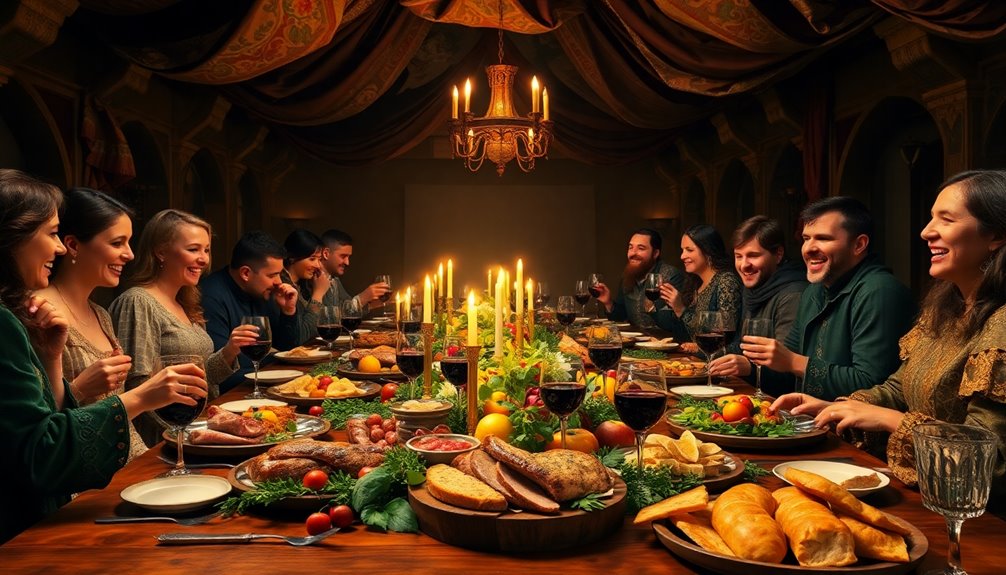
Medieval feasting traditions were grand affairs that could stretch over several days, showcasing the host's wealth and status through an array of lavish dishes.
Imagine tables laden with roasted meats, intricate pies, and assorted fruits, all designed to impress and delight. These occasions weren't just about eating and drinking; they were vibrant celebrations filled with joy and gladness.
Entertainment played a crucial role in these feasts. Jesters entertained with their antics, while musicians filled the air with lively tunes, creating a festive atmosphere that encouraged communal bonding.
As you raise your goblet filled with ale, mead, or wine, you'd engage in toasts and revelry, adding to the sense of merriment.
Food presentation was equally important. Elaborate dishes often featured stunning decorations, including the "subtlety," a sculptural centerpiece made of sugar or marzipan.
These visual delights not only satisfied the palate but also served as symbols of the host's hospitality and creativity.
Through feasting, relationships were forged, alliances strengthened, and important events celebrated.
Cultural Significance of Feasting
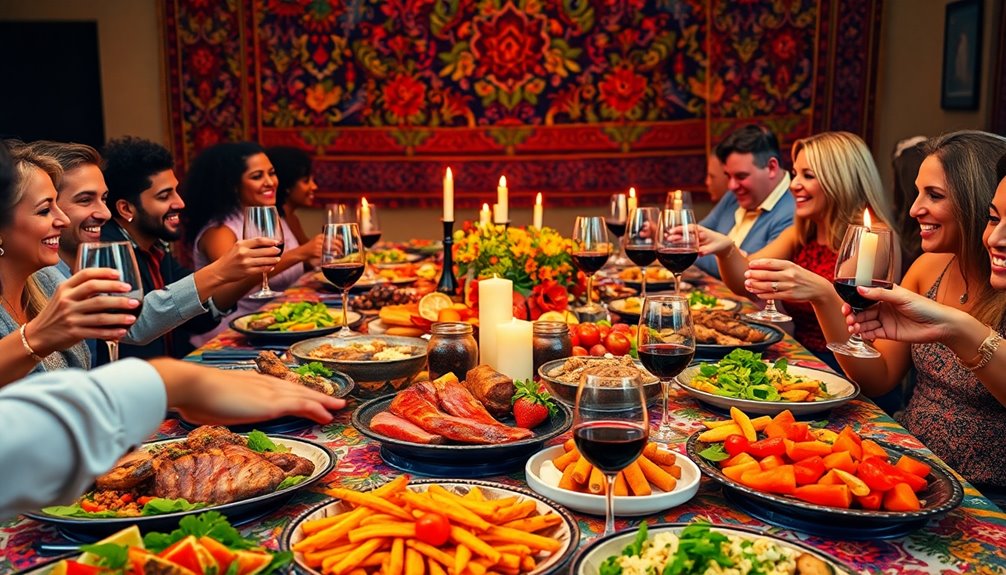
Feasting brings people together, creating a sense of community that transcends cultural boundaries. This communal activity has been a staple in human society, strengthening social bonds and celebrating significant life events across various cultures.
You'll notice that in many traditions, meals are accompanied by rituals and customs that emphasize gratitude, reflecting deep cultural values. These shared food experiences highlight the importance of connection and shared identity.
Festivals centered around food, like harvest celebrations and religious feasts, underscore the significance of seasonal cycles and divine provision in agricultural societies. When you partake in these events, you're not just enjoying a meal; you're participating in a cultural narrative that honors abundance and hospitality.
The act of feasting symbolizes generosity and community spirit, where sharing food becomes an expression of love and kinship. For example, traditional Southern dishes like fried catfish often play a central role in gatherings, reinforcing connections through shared culinary heritage.
Moreover, you can see cultural expressions of feasting in literature and art, where communal meals often serve as backdrops for storytelling and moral lessons.
These gatherings create an atmosphere where values are passed down, and connections are forged, reinforcing the importance of feasting in our shared human experience.
Misunderstanding Biblical Context
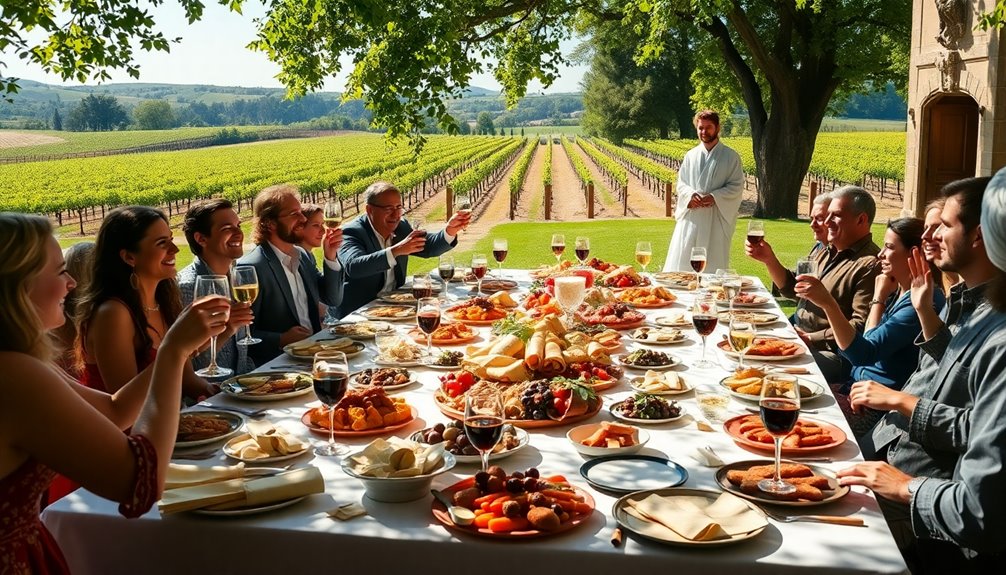
You might think that "eat, drink, and be merry" gives you a free pass to indulge without limits, but that's a common misunderstanding.
The biblical context reveals a deeper message about enjoying life as a gift from God while remaining mindful of its fleeting nature.
Let's explore how these misinterpretations can lead to a misguided pursuit of pleasure.
Debunk Common Misinterpretations
Often misunderstood, the phrase "eat, drink, and be merry" is mistakenly seen as a biblical endorsement of hedonism. In reality, its context warns against hypocrisy and disobedience, particularly in Isaiah 22:13, where such indulgence reflects a disregard for impending judgment.
When you look at Ecclesiastes 8:15, you'll find that enjoyment is rooted in gratitude and righteousness, not excess.
In 1 Corinthians 15:32, the phrase critiques a nihilistic worldview, pointing out the folly of living solely for pleasure without acknowledging eternal consequences. It reminds you that life is more than mere indulgence; it's about understanding the spiritual responsibilities that come with it.
Luke 12:19 further illustrates this with the parable of the rich fool, who places trust in material wealth while neglecting spiritual matters.
These texts ultimately juxtapose enjoyment with spiritual responsibility, urging you to seek deeper fulfillment through a relationship with God rather than chasing fleeting earthly pleasures.
Misinterpretation of Hedonism
The widespread misinterpretation of "eat, drink, and be merry" often leads people to overlook its deeper meaning within a biblical context. Many assume this phrase promotes hedonism, encouraging a life of indulgence without consequence.
However, in reality, scripture warns against such frivolous living. Isaiah 22:13 reveals this warning against a mindset that neglects divine judgment.
In 1 Corinthians 15:32, the phrase critiques a nihilistic worldview, showing the folly of pursuing pleasure without considering spiritual ramifications.
While Ecclesiastes 8:15 does suggest enjoying life, it emphasizes gratitude and righteousness rather than mere indulgence.
The parable of the rich fool in Luke 12:19 starkly contrasts moments of merriment with the necessity of spiritual awareness, reminding us that materialism can blind us to more profound truths.
Ultimately, Romans 6:11 and 1 Peter 1:16 highlight the biblical call to holiness, underscoring the importance of righteous living over hedonistic pursuits.
Feasting With Friends Weekly
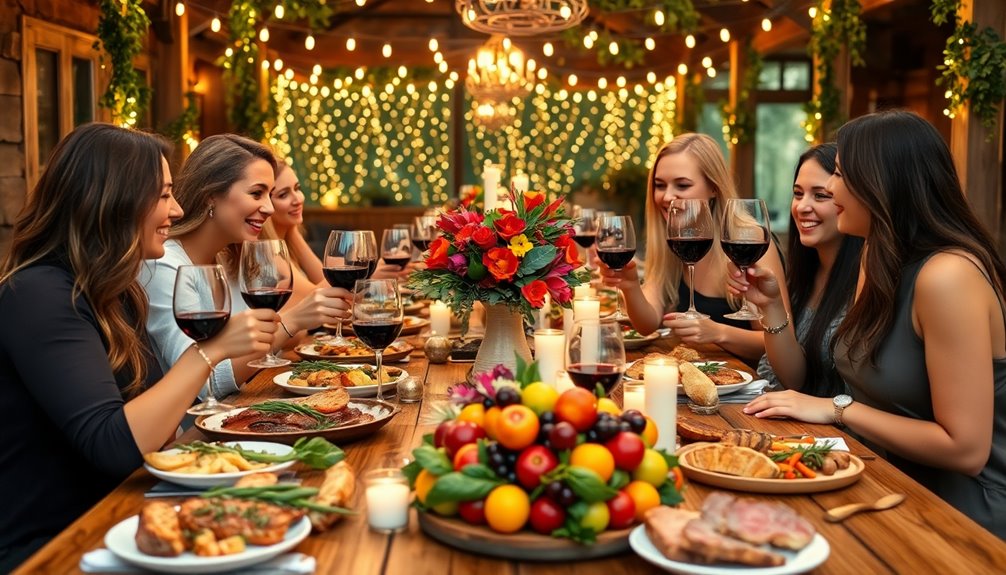
Gathering for a weekly family dinner or organizing a group potluck can turn mealtime into a cherished tradition. You'll not only strengthen bonds with friends and family but also explore new flavors and recipes together. These shared meals create lasting memories, making each gathering something to look forward to. Additionally, incorporating traditional Brazilian dishes can elevate your culinary experience and introduce everyone to vibrant flavors and rich cultural heritage.
Weekly Family Dinner Traditions
Weekly family dinner traditions, often called "Feasting With Friends Weekly," encourage you to gather with your loved ones and enjoy delicious meals together. By incorporating specific themes or cuisines, you make each dinner a unique culinary experience, sparking creativity and participation from everyone at the table.
These dinners often include meaningful rituals, like lighting candles or sharing stories, which enhance the community feel during mealtime. You'll find that regular family dinners improve communication and emotional well-being, especially for children, positively impacting their academic performance. Additionally, these gatherings provide an opportunity for children to develop essential social skills that are crucial for their overall emotional and cognitive development.
Exploring various cultural cuisines during these dinners not only broadens your culinary horizons but also fosters appreciation for diversity among family members.
When you gather for these meals, you create lasting memories, build traditions, and deepen connections. The laughter and shared experiences make dinner time an event you all look forward to each week.
Group Potluck Dinner Events
Weekly family dinners can seamlessly evolve into group potluck dinner events, where everyone contributes their favorite dishes, creating a vibrant tapestry of flavors and traditions.
These gatherings foster community and friendship, allowing you to share your culinary creations in a relaxed atmosphere. Each attendee brings a dish, resulting in a diverse array of cuisines that enhances your dining experience.
Potlucks also help reduce individual costs; the shared responsibility of providing food makes it an economical way to enjoy a meal together.
You'll find that the anticipation of these weekly events builds connections and strengthens relationships among participants.
To keep things exciting, consider organizing themed potlucks, like international cuisine nights or seasonal specialties. This adds an element of fun and creativity, allowing you to explore new recipes and flavors, such as making a Turkey Bean and Tomato Zoodle Bowl to provide a low-carb option for your guests.
As you enjoy the various dishes, don't forget to bring your favorite drink to complement the feast.
Final Thoughts on Celebration
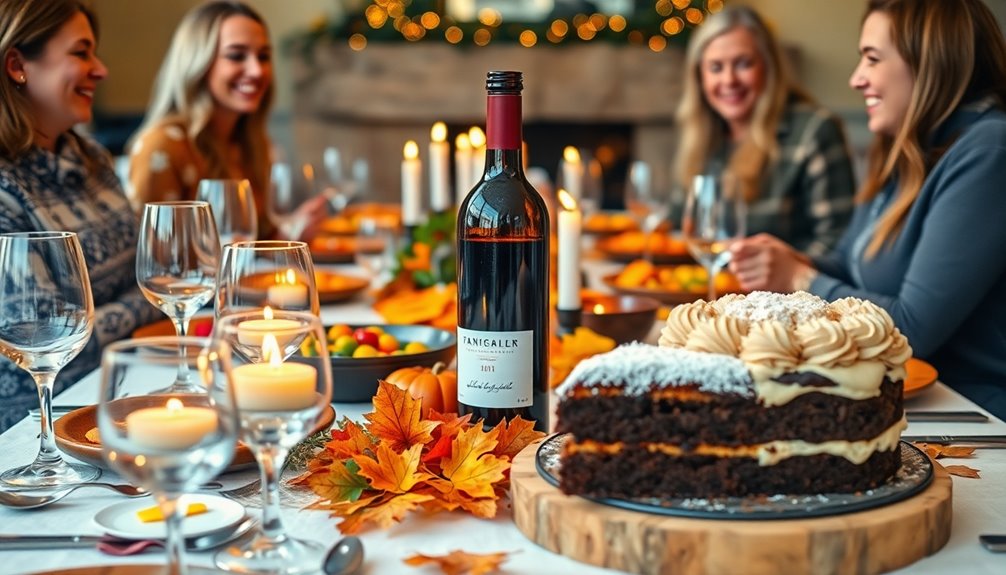
Celebration embodies a powerful sense of community, reminding us of the joy found in togetherness. When you gather with friends and family for a meal, you're not just sharing food; you're creating lasting memories that enrich your life. Major life events like weddings and birthdays highlight our shared desire to commemorate significant milestones. These celebrations often revolve around traditional dishes and drinks, showcasing the cultural importance of culinary heritage in fostering connections.
As you partake in communal meals, you may notice an increase in feelings of gratitude and contentment. This reinforces the idea that joy is truly found in togetherness, as you share laughter and stories over a feast. Research supports this, showing that celebrations and social gatherings can enhance mental health, boosting your sense of belonging and happiness. In fact, enjoying a cup of coffee from sustainable brands can further elevate the experience, as it reflects a commitment to ethical choices and community support.
In a world where life can feel overwhelming, embracing celebration allows you to pause, reflect, and savor the moments that matter.
Additional Resources
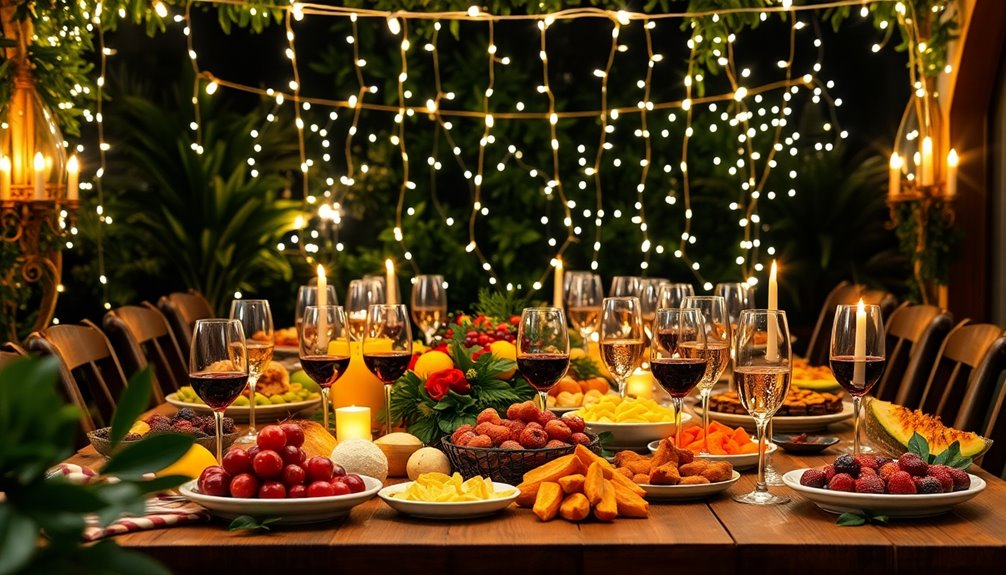
To enhance your understanding of the joyous spirit captured in "eat, drink, and be merry," a variety of resources are available. Start by reading Ecclesiastes in the Bible, especially chapter 8, which highlights the importance of joy in the fleeting life God has given. This perspective will help you appreciate why we should celebrate and enjoy life's moments.
Next, dive into the philosophical texts of Epicurus. His teachings on pleasure, moderation, and the avoidance of pain will deepen your grasp on why you should eat, drink, and be glad.
Shakespeare's plays also offer rich insights into the cultural attitudes toward eating and drinking, showcasing how these practices shaped social interactions of his time.
For a more critical angle, review scholarly articles that discuss the theological implications of "eat, drink, and be merry." These analyses often contrast the phrase with teachings on morality and eternal life, providing a broader context.
Finally, explore modern interpretations in literature and music. This evolution reflects how the themes of pleasure and existence resonate with contemporary life, ensuring the message remains relevant today. Additionally, consider the role of user-friendly navigation in enhancing how we experience these cultural reflections, as it can significantly impact our engagement with such resources.
Frequently Asked Questions
What Is the Full Quote of "Eat, Drink, and Be Merry"?
The full quote you're looking for comes from 1 Corinthians 15:32, which states, "Let us eat and drink, for tomorrow we die."
This phrase captures a sense of urgency about enjoying life, as it reflects the temporary nature of existence.
When you read it, consider how it encourages you to embrace joy and gratitude in everyday moments, while also reminding you of the deeper responsibilities and choices you face in life.
Who Said "Eat, Drink, and Be Merry"?
The phrase "eat, drink, and be merry" is often attributed to biblical sources, specifically in the context of enjoying life's pleasures.
While it appears in scripture, many recognize it as a common cultural saying reflecting a philosophy of savoring the moment.
Epicurus, a Greek philosopher, also echoed similar sentiments about pleasure and happiness.
Over time, various authors and musicians have embraced this idea, making it a timeless expression of joy and celebration.
Does the Bible Say Eat, Drink, and Be Merry?
Yes, the Bible does mention the idea of "eat, drink, and be merry," but it emphasizes balance.
You'll find this sentiment in several verses, like in Ecclesiastes, where enjoying life is seen as a gift.
However, it also warns against indulgence without considering moral and spiritual responsibilities.
What Does Eat Drink and Be Merry Mean?
When you hear the phrase "eat, drink, and be merry," it encourages you to embrace joy and indulge in life's pleasures. It suggests that you should savor the present moment, finding happiness in simple experiences like good food and company.
However, it's essential to balance enjoyment with responsibility, as the phrase can sometimes mislead you into thinking that indulgence is the only way to live. Life's richness often lies in both pleasure and purpose.

